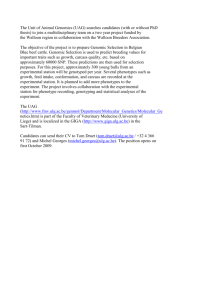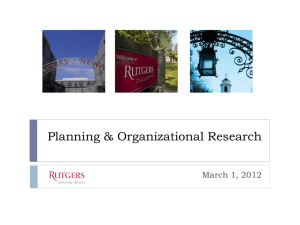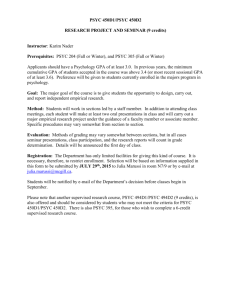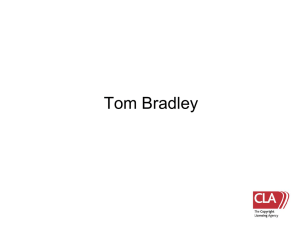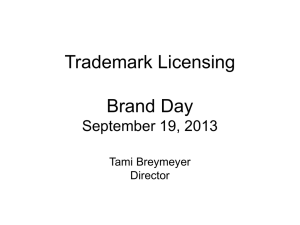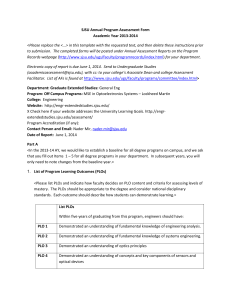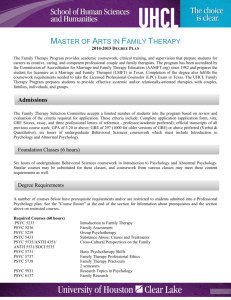2013-2014
advertisement
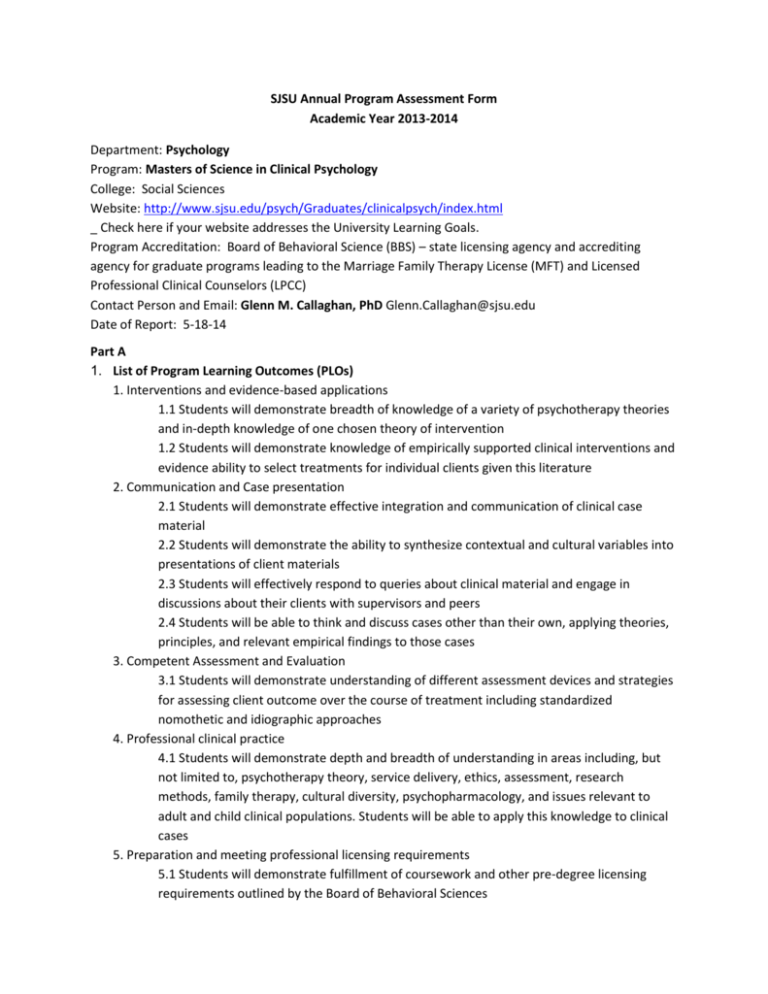
SJSU Annual Program Assessment Form Academic Year 2013-2014 Department: Psychology Program: Masters of Science in Clinical Psychology College: Social Sciences Website: http://www.sjsu.edu/psych/Graduates/clinicalpsych/index.html _ Check here if your website addresses the University Learning Goals. Program Accreditation: Board of Behavioral Science (BBS) – state licensing agency and accrediting agency for graduate programs leading to the Marriage Family Therapy License (MFT) and Licensed Professional Clinical Counselors (LPCC) Contact Person and Email: Glenn M. Callaghan, PhD Glenn.Callaghan@sjsu.edu Date of Report: 5-18-14 Part A 1. List of Program Learning Outcomes (PLOs) 1. Interventions and evidence-based applications 1.1 Students will demonstrate breadth of knowledge of a variety of psychotherapy theories and in-depth knowledge of one chosen theory of intervention 1.2 Students will demonstrate knowledge of empirically supported clinical interventions and evidence ability to select treatments for individual clients given this literature 2. Communication and Case presentation 2.1 Students will demonstrate effective integration and communication of clinical case material 2.2 Students will demonstrate the ability to synthesize contextual and cultural variables into presentations of client materials 2.3 Students will effectively respond to queries about clinical material and engage in discussions about their clients with supervisors and peers 2.4 Students will be able to think and discuss cases other than their own, applying theories, principles, and relevant empirical findings to those cases 3. Competent Assessment and Evaluation 3.1 Students will demonstrate understanding of different assessment devices and strategies for assessing client outcome over the course of treatment including standardized nomothetic and idiographic approaches 4. Professional clinical practice 4.1 Students will demonstrate depth and breadth of understanding in areas including, but not limited to, psychotherapy theory, service delivery, ethics, assessment, research methods, family therapy, cultural diversity, psychopharmacology, and issues relevant to adult and child clinical populations. Students will be able to apply this knowledge to clinical cases 5. Preparation and meeting professional licensing requirements 5.1 Students will demonstrate fulfillment of coursework and other pre-degree licensing requirements outlined by the Board of Behavioral Sciences 2. Map of PLOs to University Learning Goals (ULGs) M.A. Clinical Psychology 1. Interventions and evidence-based applications 2. Communication and Case presentation 3. Competent Assessment and Evaluation 4. Professional clinical practice 5. Preparation and meeting professional licensing requirements ULG 1 Specialized Knowledge X ULG 2 Broad Integrative Knowledge X ULG 3 Intellectual Skills ULG 4 Applied Knowledge X X X X X X We developed this through collaborative discussion with all members of the MS Clinical Psychology Program. X ULG 5 Social & Global Responsibilities X X 3. Alignment – Matrix of PLOs to Courses 1. Interventions and evidence-based applications 1.1 Students will demonstrate breadth of knowledge of a variety of psychotherapy theories and in-depth knowledge of one chosen theory of intervention 1st and 2nd year comps PSYC 258, PSYC 243, PSYC 224A, B 1.2 Students will demonstrate knowledge of empirically supported clinical interventions and evidence ability to select treatments for individual clients given this literature 1st and 2nd year comps Fieldwork evaluation Psych 210, 211, 258, 208, 203A, 225, 260 2. Communication and Case presentation 2.1 Students will demonstrate effective integration and communication of clinical case material 2.2 Students will demonstrate the ability to synthesize contextual and cultural variables into presentations of client materials 2.3 Students will effectively respond to queries about clinical material and engage in discussions about their clients with supervisors and peers 2.4 Students will be able to think and discuss cases other than their own, applying theories, principles, and relevant empirical findings to those cases Fieldwork Practicum 2nd year comp (oral) course presentations in PSYC 208, 209, 210, 211, 225 3. Competent Assessment and Evaluation 3.1 Students will demonstrate understanding of different assessment devices and strategies for assessing client outcome over the course of treatment including standardized nomothetic and idiographic approaches Fieldwork Practicum 2nd year comp (oral) 210, 211, 258, 291 4. Professional clinical practice 4.1 Students will demonstrate depth and breadth of understanding in areas including, but not limited to, psychotherapy theory, service delivery, ethics, assessment, research methods, family therapy, cultural diversity, psychopharmacology, and issues relevant to adult and child clinical populations. Students will be able to apply this knowledge to clinical cases Fieldwork Practicum 1st year comps 2nd year comp (oral) Psych 208, 203A, B, 225, 260 5. Preparation and meeting professional licensing requirements 5.1 Students will demonstrate fulfillment of coursework and other pre-degree licensing requirements outlined by the Board of Behavioral Sciences satisfactory completion of courses and fieldwork evaluations performance on comps assessed post graduation with licensing pass rates We are currently developing a matrix showing how each learning objective is met with different courses and how each course maps onto licensing objectives. We are revising and further developing SLOs for every course in our graduate program in addition to our self-named Licensing Learning Objectives (LLOs) that tie their course training not only to the program objectives but to the specific licensing objectives (requirements) set by the BBS. An example of these can be found in our two newly developed courses (PSYC 226 and PSYC 260). 4. Planning – Assessment Schedule Because the program is just back up and running in this coming Fall (2014), we know that much of our assessment planning is still a work in progress. We plan to assess each of the PLOs in Spring and then Fall semester to determine if we are meeting the goals and objectives as we have built them. 5. Student Experience We will be building our MS Student Handbook that will all of the PLOs included and the map to the ULGs. We welcome student feedback about these at all times. Part B <The following items 6-9 will be provided by the IEA office by March 1 every year. The departments are welcome to obtain the data on their own, and/or to report other relevant data for their particular programs if deemed important.> 6. Graduation Rates for Total, Non URM and URM students (per program and degree) Our program has not graduated students in the past two years. We expect our first graduating class for the MS Clinical program to be in 2016 7. Headcounts of program majors and new students (per program and degree) We just admitted our first cohort into the new 60-unit program. There will be 11 students enrolling for the Fall 2014 semester as first year graduate programs. 8. SFR and average section size (per program) The expected SFR in the MS Clinical program will be 3 students to 1 faculty advisor. All classes will have a minimum of 11 students. 9. Percentage of tenured/tenure-track instructional faculty (per department) All MS clinical faculty are tenured (4) except 1, she is currently tenure track. Part C 10. Closing the Loop/Recommended Actions The program was recently approved, and we recruited our first cohort into the program. We have worked very, very hard to make this happen. There are a few open loops that include perfecting the CLOs for each course as well as License Learning Objectives (LLOs) that we have developed to map the CLOs to the requirements by the Board of Behavioral Sciences (BBS) for state licensure. 11. Assessment Data Data will not be available for this iteration of the program until the following years when students have gone through at least one year. 12. Analysis Please see above. 13. Proposed changes and goals (if any) Again, we will continue to develop CLOs, map those to our PLOs and to the LLOs, an added feature of our new program.

